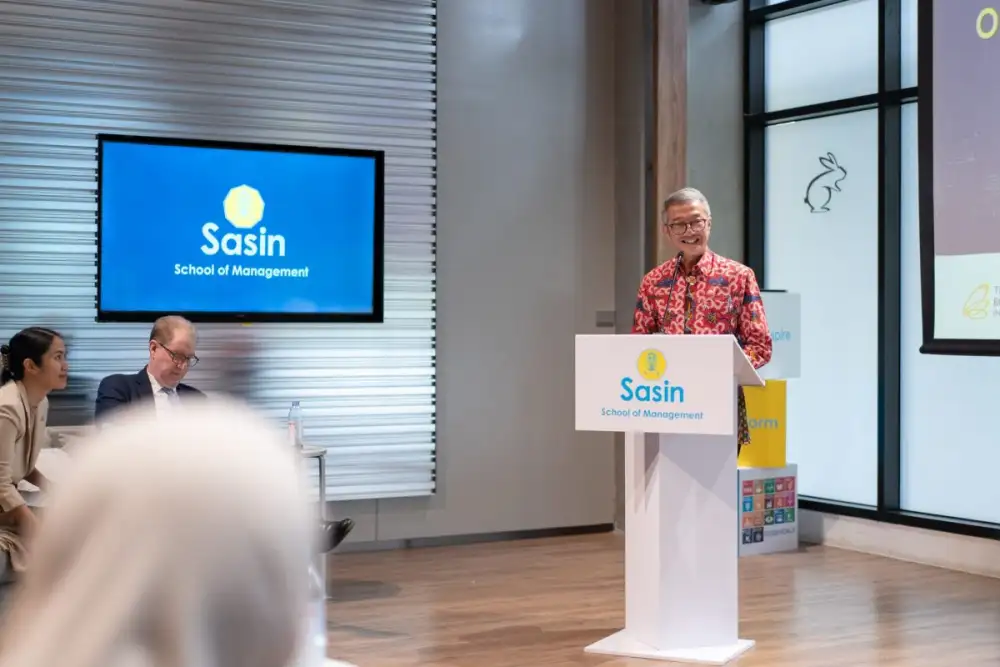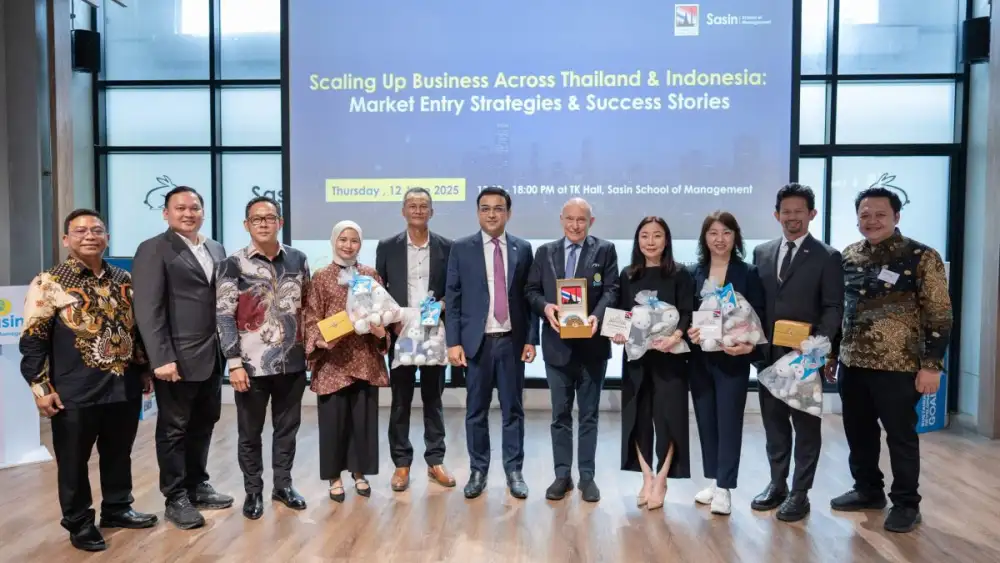
Business leaders are embracing disruption and unpredictability, finding innovative ways to respond to market shifts and evolving consumer behavior. Senior executives from Thailand and Indonesia shared their insights at the executive forum, "Scaling Up Business Across Thailand & Indonesia: Market Entry Strategies & Success Stories," hosted by Sasin in partnership with the Indonesia-Thai Chamber of Commerce (INTCC) on June 12.

Rachmat Budiman, Ambassador of the Republic of Indonesia to Thailand, stated that this year marks the 75th anniversary of diplomatic relations between the two countries. He emphasized the need to translate this longstanding partnership into tangible outcomesexpanding market access and developing sustainable infrastructure. Thanita Sirisup, Senior Executive Investment Advisor, Thailand Board of Investment (BOI), stressed the importance of closer collaboration with ASEAN partners, including through joint ventures between Thai and Indonesian firms.
Rachada Apiromdej (MBA, Sasin 1995), Founder and CEO of THINK NEXT ASIA, presented emerging consumer trends that Indonesia and Thailand can leverage. "When change bumps against basic needs, it creates tensionand that gap is best solved through innovation," she said. One trend, "Mirror Mirror," is the use of AI to forecast future behaviors and preferences. A notable application is the Death Clock, which predicts lifespan using AI trained on over 1,200 studies and data from more than 61 million individuals.
Another trend is "Heritage Renewed," which blends traditional culture with modern elements. "People want products that adapt to local cultures," said Rachada. She cited the Grand Ring at the Osaka Expo 2025, designed by Sou Fujimoto using traditional Japanese carpentry techniques to create the largest crisscrossing wood building structure on earth, and Black Myth: Wukong, a game rooted in Chinese mythology that became the second most-played title on Steam and boosted tourism to sites featured in the game by 300 percent.
The forum also featured a panel discussion with business executives including Niwat Boonyad, Senior Vice President, PT ITM Bhinneka Power, Banpu Public Company Limited, and Vice President, Thai Chamber of Commerce Indonesia; Kasemsri Charoensiddhi, President of Bank Maspion, a subsidiary of Kasikornbank PLC; Bani Maulana Mulia, Group CEO, Samudera Indonesia; and Kun Riana Aplika, Senior Manager and Bangkok Branch Manager, Garuda Indonesia.
"If the world were normal, it wouldn't be as interesting as it is now," said Bani Maulana Mulia, highlighting how disruption fuels innovation. He shared that Samudera has operated internationally since its early daysserving as an agent for global shipping lines even before the 1950s. As a private company without political ties or institutional backing, Samudera has long depended on innovation and resilience to stay afloat.
"We are a private company, so we don't have a big backup behind us. We always have to think of ways to keep ourselves alive," Bani said. He credits the company's strength to its Indonesian roots and a constant drive to improve, adapt, and thrive.
Echoing this theme of adaptability, Kun Riana Aplika emphasized how businesses must keep pace with changing market dynamicsespecially in the digital era.
"We must customize our services to market demands, offering personalized treatment and inflight services," she said. To remain competitive amid evolving passenger expectations, she stressed the need for continuous improvement and pointed to niche tourism segments, such as wellness and medical tourism, as key areas for growth.
Kasemsri Charoensiddhi (MBA, Sasin 1998) added another layer to the discussion, emphasizing the importance of understanding customer needs and providing tailored banking solutions. Reflecting on Thai companies expanding into Indonesia, she noted that early profitability is uncommon. Therefore, access to local insights and strategic business matchmaking are crucial to connecting with the right partners and ensuring long-term success.
On the topic of Indonesia's economic landscape, Niwat pointed to the country's abundant natural resources as a key factor behind the company's expansion. He recalled a time during the Asian financial crisis when investor confidence was low and growth stagnant. However, the business environment has since improved, showing annual growth rates of 20 to 30 percent. He attributed this momentum to natural resource wealth, a strong domestic market, and an ongoing commitment to adaptation. "If we keep doing things the way we have been, we won't change fast enough," he said. "The disruptions will force us to change faster"